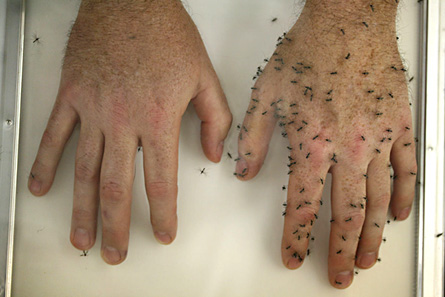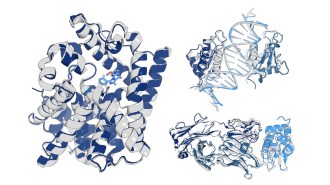- More than 2 years ago
New chemicals make mosquitoes bug off for at least three times longer than current insect repellents, researchers report.

In addition to lasting longer, these new chemicals don’t have the unpleasant smell or stickiness of the most common mosquito repellent, a compound called DEET. Decades of previous research had identified only three other repellents with performance similar to DEET, but none that lasted much longer.
“Outperforming DEET is significant, since the practical repellency of the big four are pretty similar,” comments Daniel Strickman, an entomologist at the U.S. Department of Agriculture’s Agricultural Research Service in Beltsville, Md.
“I was amazed,” says Ulrich Bernier, a member of the research team that identified the new repellents and a chemist at the USDA Center for Medical, Agricultural and Veterinary Entomology in Gainesville, Fla. “I’ve gotten so used to everything failing, it was so refreshing to have something actually do better than DEET.”
To search for novel repellent compounds, Bernier and his colleagues taught a computer program to recognize the structural features of a chemical that make it a good mosquito repellent. The program mimics the web of connected nerve cells in brain tissue. These simulated neural networks can learn from experience by adjusting the strength of the connections among the virtual cells.
The scientists trained the software to recognize promising chemicals by feeding it the molecular structures of 150 known repellents. Based on those examples, the program learned to identify the chemical traits of a good repellent without the researchers having to know what those traits were.
Using the trained software, Bernier and his colleagues
tested about 2,000 variants of a compound found in black pepper that has
insect-repellent properties. The software identified 23 novel potential repellents.
In subsequent tests on human volunteers, some of the compounds repelled
mosquitoes for up to 73 days, while DEET lasted only 17 days, the team reports
in the May 27 Proceedings of the National
Academy of Sciences.
In real-world use, though, the repellents would not last this long. When applied directly to the skin, DEET lasts up to about 5 hours. In the experiments, volunteers wore gloves with small holes and covered with patches of muslin soaked with each chemical, rather than having the compounds applied directly to their skin. Toxicity tests and experiments with insects other than mosquitoes were not part of the current research, which was partly funded by the Department of Defense as part of USDA’s Deployed War-Fighter Protection Program.
“That was the principal motivation, the usability for the military,” Bernier says. “You don’t want your soldiers reapplying every 15 to 20 minutes.”





